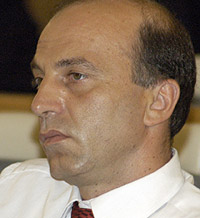These days it seems as though the International Monetary Fund representatives are worrying about their reputation and PR and have started actively campaigning with the purpose of not having their reputation go down just because of the USD exchange rate changes.
The first thing they did was organize a seminar in the CB building dedicated to their activities in Armenia. The second step was to organize a parliamentary hearing.
The main speaker was the IMF representative in Middle East and Central Asia, Juliano Berengo. In his speech, Berengo talked about IMF-Armenia ties, which started back in 1992, and added that Armenia’s economy is better than it was when the two started working together. There were many questions concerning the USD exchange rate changes in Armenia.
Mr. Berengo’s answers didn’t differ much from those of the RA CB head Tigran Sargsyan and IMF representative in Armenia James Macque. He said that the mission of the CB is to keep prices stabile and it may regulate the exchange rates from time to time. But in terms of its long-term application, the rates must be formed in the market.
He agreed with the fact that as a result of these changes, many people with incomes in dollars lost money. He said
“You should understand that it is due to the increase of productivity and economy that Armenia’s national currency rates have gone up”. In response to the note that this growth should also support the production growth and that these changes are bad for exporters he said, “Exporters have a serious problem and we have enough reasons to think about them. But there are other factors besides the exchange rates.”
NA parliamentarian Tatul Manaseryan said that before these changes, there were two types of extra profit for importers- monopolistic profit (products imported by one person or one company only) and shadowed profit. However, after these changes they have one more type of profit, which brings super-profit due to the changes. “Wouldn’t be it better to tax these super profits and use this money for taking care of the needy citizens?” asked Tatul Manaseryan. Juliano Berengo didn’t agree with him, “The more the income grows, the more income tax is paid. Taxes should be the same regardless of the profit, there shouldn’t be a difference here”. Economist Edward Aghadjanov was also present during the hearing and was debating with CB board representative Vache Gabrielyan during the break. The latter said that if they stopped that process it would lead to inflation, which is bad for consumers. As for foreign transfers, V. Gabrielyan said that the people who say that 60% of foreign transfers are directed towards consumers and needy people are not right and added that the real mark didn’t exceed 30%. E. Aghadjanov promised that in his speech he would bring up numbers and would prove that production suffered much as a result of their “deals” with importers. He didn’t go further in detail after that. “This policy is very bad for our production”, said the economist and added that he would like to ask the CB head why he has punished the exporters so harshly.
The hearing lasted almost six hours. Many people were there to get answers to their questions concerning the rate changes, but they didn’t get any answers that would explain anything. As for Berengo, MP Hrant Khachatryan said, “The speaker said all that an IMF representative could say. I think that he feels bad as a person and as a specialist because he knows very well that the IMF is not really doing its job in Armenia”.
H. Khahatryan said that we shouldn’t believe everything that international organizations say.
As for MP Tatul Manaseryan, he asked very interesting questions, such as how the IMF specialists rated and reported that the corruption level has fallen down in Armenia, what we can do for getting the people to trust in the CB or what made the IMF representative believe that the poverty level had gone down as well. In response to these questions, Berengo said that he had been given official statistical information and that he had visited Armenia before that too and he felt the difference each time. It’s strange to see the IMF get active recently because if the CB has agreed with importers and carries out its projects, why does the IMF protect them? It is rare to see such an institution with huge financial resources harm its reputation in a small country like Armenia. H. Khachatryan was wrong to assume that the IMF representative was under pressure, because the IMF has been financing Armenia and telling Armenians what to do for a long time.
During the hearing, Tatul Manaseryan said that there wouldn’t be any positive results until Armenia doesn’t regulate the economic policy because monetary policy has a lot to do with economic policy i.e. Armenians should first decide what kind of country they want to have and which fields to develop. The IMF shows us the way to become a country with developed trade and service structures. Tatul Manaseryan said that he worried about the fact that the annual production capacity in GDP had gone down almost twice, but the IMF doesn’t care about that at all. As for our government, we don’t know yet whether they worry about this or not. They don’t complain and any time they get a small opportunity they don’t lose the moment to speak about the high numbers. We don’t know where this will lead us. When we listen to those people making speeches, it seems to us that we don’t have any ways to make it any more; some say that we have reached hell, while others say we are in heaven.

